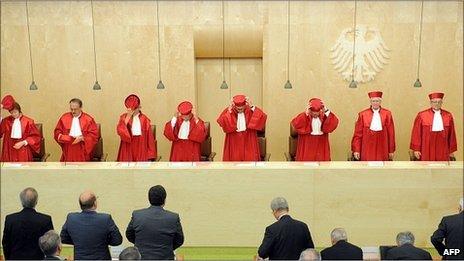Berlin gets greater power over bailouts
- Published
- comments

BERLIN: The eight judges of the German Constitutional Court in Karlsruhe did what was expected. They declared that the bailouts of euro-zone countries are legal. They rejected a complaint that bailouts broke EU laws and violated the German parliament's right to control the spending of taxpayer's money.
Germany has provided over 200bn euros (£180bn) in loan guarantees to Greece, Ireland and Portugal. Bailouts have proved the main strategy in rescuing countries facing bankruptcy. If the court had ruled against future rescues it would have caused an earthquake in the eurozone.
But the court wanted to make clear it hadn't issued a blank cheque for future bailouts. Parliament, it ruled, must have a greater say over any future "large-scale" rescue packages. Consultation would not be enough. Parliament's budget committee would have to actively approve such a step in advance.
This could complicate and slow down Germany's response to future crises. It might also limit Chancellor Angela Merkel's room for manoeuvre. Future decisions could become snared in committee, and that might alarm some officials in Brussels. It is worth reflecting that emergency aid for Greece in May 2010, which was decided in a matter of hours on a Sunday night, would not have gone through under the ruling of the court.
Other countries, too, might want to give their parliaments a greater say in these important decisions.
The court also ruled that the German parliament could not approve a deal that leads to a pooling of national debt. That would appear to rule out eurobonds. But many believe that, with the ECB buying up Italian and Spanish bonds, this amounts to a form of eurobond already, and almost certainly will result in the transfer of funds from Germany to other countries.
'Damaging' decision
I spoke today to Hans Olaf Henkel, a former head of the Association of German Industries and a plaintiff to the court. Although he was expecting this result, he said his campaign had failed and "the train could now leave the station" heading for a transfer union, where Germany would act as the paymaster for the weaker economies.
"The euro has been saved," he said, "but Europe will be severely damaged."
Christian Waldhoff, an expert for constitutional law at Bonn University, said "the rights of the German parliament have been strengthened but without tying the hands of the German government on the European stage".
The German Chancellor, Angela Merkel, said that "the constitutional court backed us completely". She was speaking as the Bundestag began debating the new powers that will be given to the EFSF, the EU's main rescue fund.
The German chancellor took on her critics, who accuse her of indecision and of damaging the European cause.
"The euro is the guarantor of a unified Europe," she said. "If the euro collapses, Europe collapses."
She said that countries that share a common currency do not go to war with each other. It was a curious observation, as many countries without their own currency don't go to war either.
She insisted again that countries like Italy and Spain must take steps to become more competitive.
"Sweeping all the problems under the carpet and talking about solidarity won't bring us stability," she said.
"The problems of a single country can imperil the currency. That is why I say we need more Europe."
Angela Merkel told parliament that Germany was doing well and she didn't see any signs of recession.
That is important, if the German people are to continue supporting plans to help other eurozone countries because, as the Allensbach Institute warned recently, a large majority of Germans have little or no faith in the euro or the European Union.